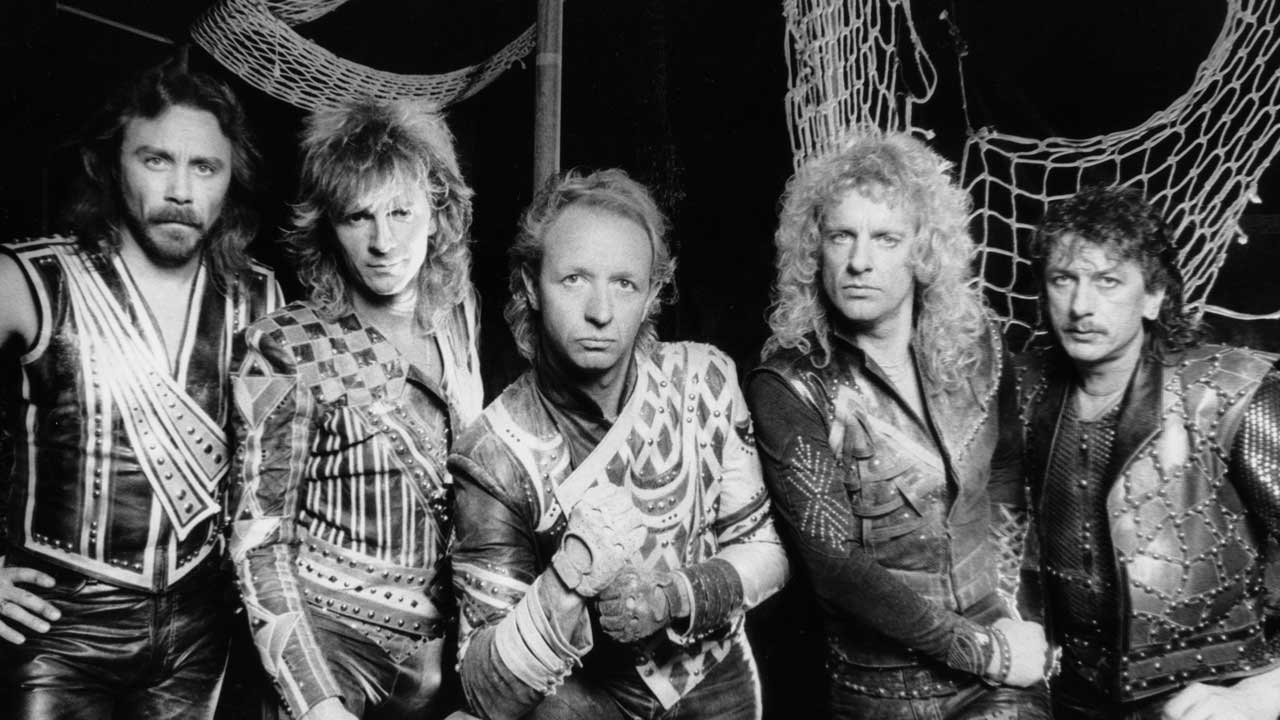Every AC/DC album ranked, from worst to best – the ultimate guide
From Powerage to Power Up, from Back in Black to Black Ice, from Rock Or Bust to... you get the idea. These are AC/DC's albums ranked, from worst to best
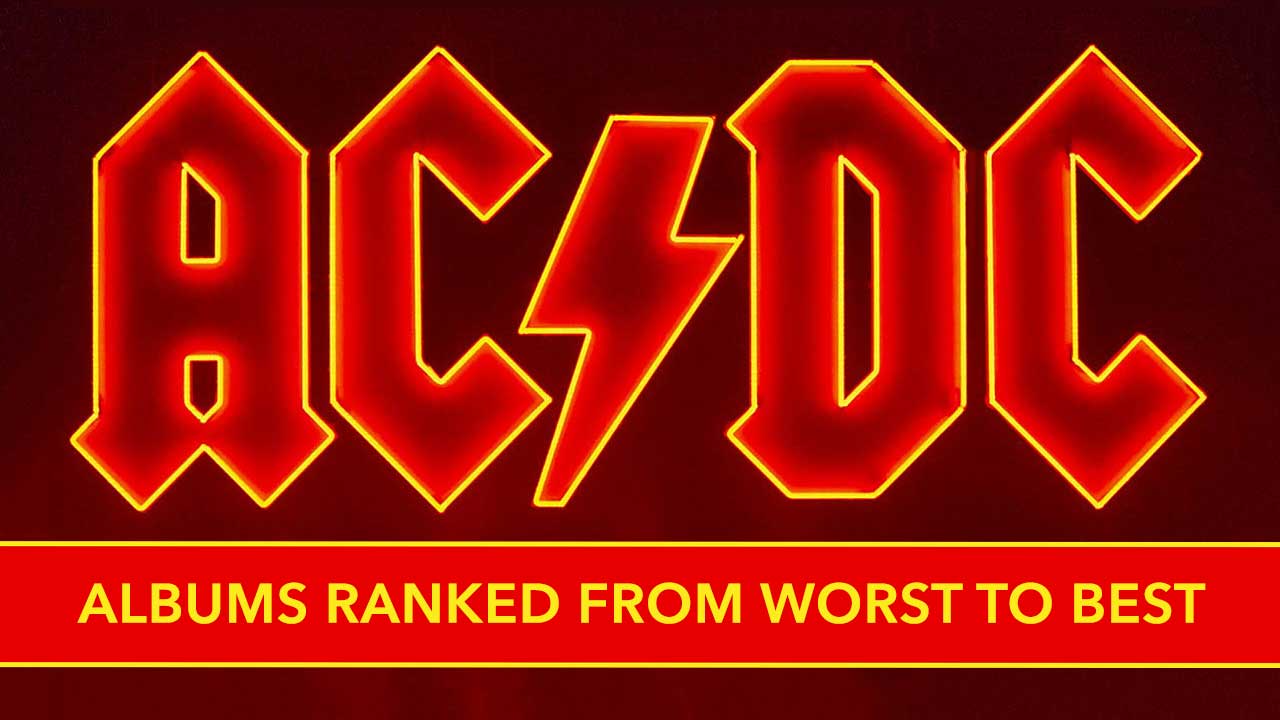
It was touch and go for AC/DC for a while. Malcolm Young gone, Brian Johnson out, Axl Rose in, Phil Rudd in court, Cliff Williams off fishing. If the question was Rock Or Bust, then the answer was almost certainly the latter.
But then something stirred. Angus Young assembled the troops in Vancouver, an album was recorded, everyone managed to keep their lips tightly sealed, and Power Up arrived in late 2020, the latest in a long line of albums stretching back 45 years.
Speaking of which, we've polled all our writers to put together our AC/DC album guide guide, from the albums that grate to those that are great. The result, we think, is the most useful album-by-album guide to the Aussie giants on the entire internet. And perhaps beyond.
We’ve included all live albums and the ’74 Jailbreak EP, but excluded all other compilations and soundtrack albums. And all the records reviewed here are the international editions, and not the original, highly-collectable Aussie versions.
One more thing: if you're just discovering AC/DC for the first time, a) where the hell have you been? and b) to be honest we envy you, as we'd love to be listening to this stuff for the first time.
- The best classic rock vinyl you need to own

Fly On The Wall (1985)
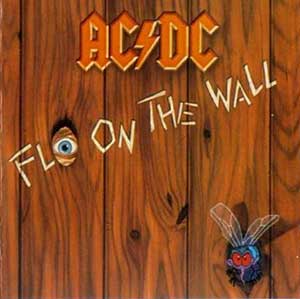
In 1980, with Back In Black, AC/DC got everything right. But just five years later, with Fly On The Wall, they got everything wrong – horribly so.
For 1983’s Flick Of The Switch, without Mutt Lange as producer, AC/DC took the DIY route, and it worked. With its stripped-down, bone-dry sound and some meaty material, it’s their most underrated record. But with Fly On The Wall they lost the plot.
Sign up below to get the latest from Classic Rock, plus exclusive special offers, direct to your inbox!
As co-producers, Malcolm Young and Angus Young somehow made AC/DC sound like a tribute act on a bad night, and as writers all they could muster was one half-decent song, Shake Your Foundations. All told, the album is a disaster. Although that said, some people like it.
Blow Up Your Video (1988)
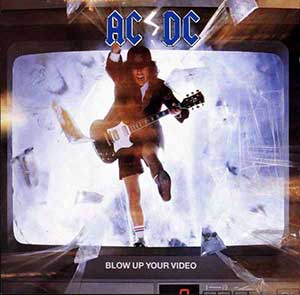
Harry Vanda and George Young, the men who had orchestrated the AC/DC sound, were back on board to produce Blow Up Your Video, and the band were primed to claw their way back to the top of the hard rock heap.
Heatseeker was the album’s runaway hit: a deceptively subtle ode to the band’s 50s-era Chuck Berry duck-walking roots that doesn't clobber you over the head like the majority of AC/DC mega-jams do, but rather hits a thrumming, low-key groove and sticks with it. The next single That’s The Way I Wanna Rock’n’Roll takes a hard left from the clanging, metal-dominated 80s and essentially imagines a hard-rock Elvis Presley. The message was clear: trends come and go, but AC/DC were forever.
Still, Blow Up Your Video is not a great AC/DC album. Apart from those two songs it’s largely a slog through fairly pedestrian deep cuts. And that’s really the major difference between great AC/DC albums, and not-so great ones: the good ones are all killer, no filler, with every track a finely crafted morsel of hard-core rock’n’roll so tight and lethal it can’t be reasoned with, stacked two-sides high.
Back in their salad days, AC/DC were working-class heroes who knew how much sweat went into every buck, and that’s why the early albums were so dense with good stuff. You earned it, and they took pride in a job well done. Nobody ever bought Powerage and felt cheated. You might feel a little slighted banging through go-nowhere boogie-dirges like Ruff Stuff, Go Zone or Nick of Time, however.
Flick Of The Switch (1983)
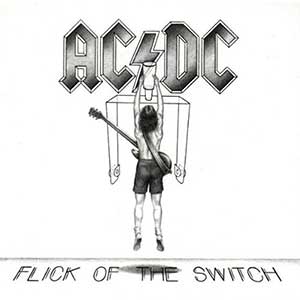
Recorded at Compass Point Studios in Nassau, in the Bahamas where AC/DC created Back In Black, the Youngs sought to get back to basics, something more immediate, less refined, than their previous record For Those About To Rock. This they got, as Flick Of The Switch definitely seems thrown together. A bit of grit never hurt an AC/DC song – the problem is that the songs are unexceptional.
The material ranges from weak (Bedlam In Belgium, Nervous Shakedown) to acceptable (Guns For Hire, the title track, Badlands) by way of boring (Rising Power, Deep In The Hole). There’s a tang of reheated leftovers about the riffs, while lyrically the leitmotif has shifted from impish to oafish. A change from Lange wasn’t necessarily a mistake, but not having a strong producer involved to make sure AC/DC cut the mustard certainly was.
’74 Jailbreak (1984)
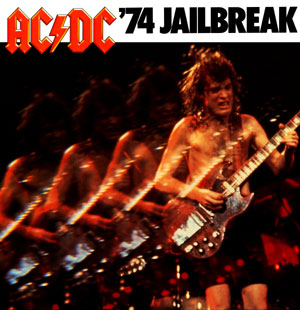
It’s more of an EP than an album, but for the sake of completeness, it’s worth looking at this mini-album released in 1984 by a record company seeking to keep the AC/DC sweet stuff coming. It may have been a cynical move, but at least it brought the title track to international attention.
Originally the final track on the Australian release of Dirty Deeds Done Dirt Cheap, and a single in 1976, Jailbreak had been excised from the international version of that album, meaning that, four years after Bon Scott's death, it was the first time many of us heard his gleeful tale of dirty deeds and desperate measures. A great slice of blues storytelling, Bon has possibly never sounded more like his hero Alex Harvey than here, while Angus Young's SG-imitation of spotlights, sirens and rifle fire are a sweet touch.
The other tracks all originally appeared on the Australian release of debut album High Voltage. You Ain’t Got A Hold On Me is a decent mid-paced rocker, Show Business is almost Status Quo-like in its simple boogie, while Soul Stipper is AC/DC at their funkiest, with a backing track that could have come straight out of a Blaxploitation movie. Baby, Please Don’t Go is a cover of the Big Joe Williams song made famous by Van Morrison’s Them and the original opener on High Voltage. It’s also the EP’s second most essential track: a statement of intent from a young band starting out, it’s the blues refracted through an Australian prism – fast, tough and retooled for the bar-rooms of Sydney.
Ballbreaker (1995)
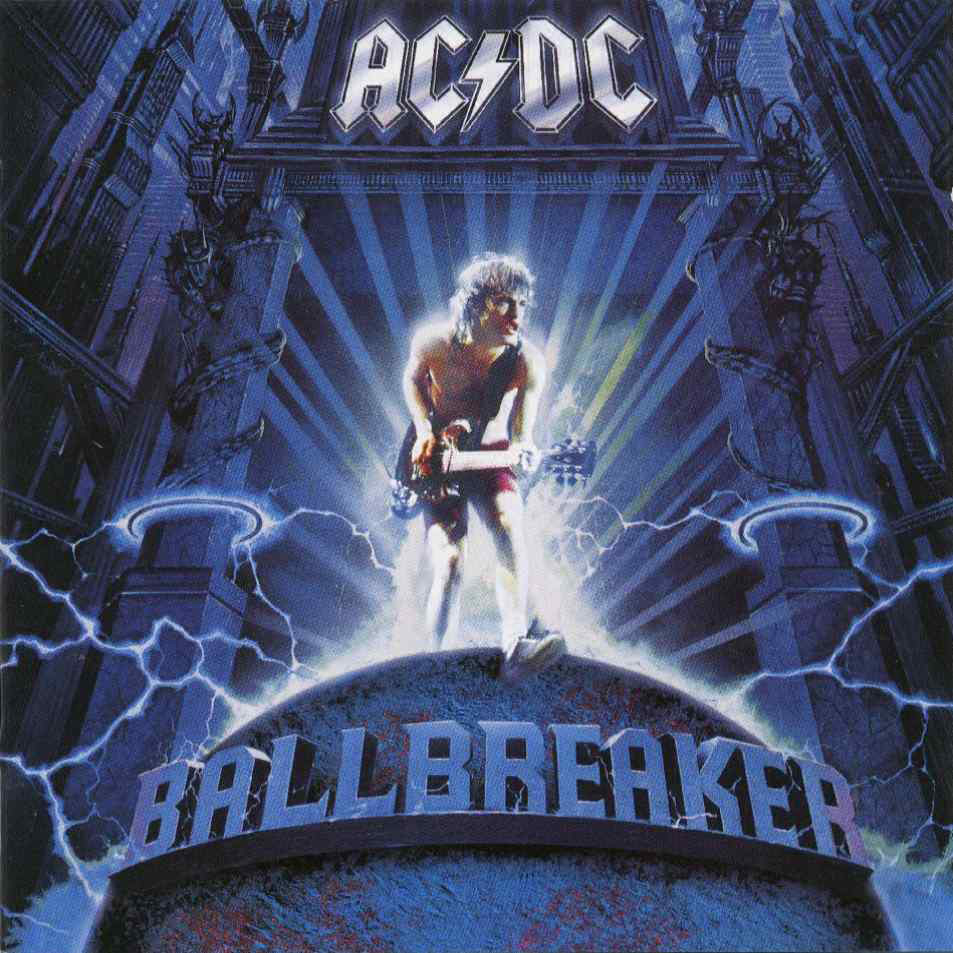
With drummer Phil Rudd back and longtime AC/DC fan Rick Rubin on board as producer and promising to restore the classic sound of the band’s earliest recordings, things looks promising. However, dogged by production problems, they struggled to get a good drum sound, ditched 50 hours-worth of recordings, switched studios and over-ran into Rubin’s next project (the Red Hot Chili Peppers’ One Hot Minute album). Suddenly AC/DC were sharing their producer – a producer whose technique consisted of getting them to play songs over and over until the band were bored of hearing them.
To Rubin’s credit, though, Ballbreaker sounds fantastic – as warm and inviting as the hum of a vintage valve amp – but it contains no truly great songs. Lairy opener Hard As A Rock, with its staccato riff and ludicrously priapic lyrics (‘Her hot potatoes, will elevate ya’) is the pick of the bunch, while the closing title track was as agreeably filthy as anything from Dirty Deeds (‘She threw me on the bed, her hand went for my throat/As I began to choke: “Honey shoot your load!”’) but almost everything in-between is the definition of ‘filler’.
Save for a curious meditation on religious fundamentalism with Burnin’ Alive, based on the Branch Davidian cult siege in Waco, Texas, Ballbreaker is hilariously over-obsessed with sex, to the point where Angus and Malcolm’s cringeworthy lyrics actually distract from some fine old-school riffs.
Stiff Upper Lip (2000)
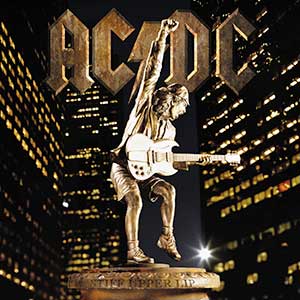
Reunited with George Young, and back in Vancouver, although at Bryan Adams’ Warehouse Studio this time, AC/DC restored the balance between authenticity and quality with Stiff Upper Lip. A much more nuanced, less wildly excitable affair than its predecessor Ballbreaker, the album tapped into the band’s oldest inspirations – Chuck Berry riffs, ZZ Top boogie, Muddy Waters’ electric blues – to fashion a record that could almost be described as ‘mature’. Almost.
Any album that begins with the heroically dumb lyric ‘I was born with a stiff’ isn’t going to be entirely house-trained, but on tracks such as the rolling House Of Jazz, the sweetly choogling Safe In New York City and the down-’n’-dirty Satellite Blues, the band harnessed some of the same understated, controlled power that they’d invested in Powerage. Here, crucially, AC/DC pulled off the trick they’d mastered during the Bon Scott years, of making a whole lot of preparation and hard work sound effortless.
Black Ice (2008)
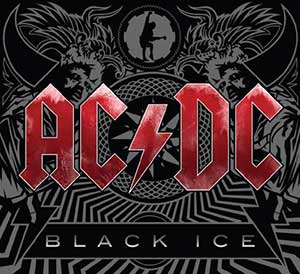
Having injected new life and purpose into Bruce Springsteen and the E Street Band’s decades-old sound on a brace of hit albums, producer Brendan O’Brien went on to repeat that feat with Black Ice.
An accomplished guitarist in his own right, O’Brien focused on the nucleus of AC/DC’s attack: Malcolm Young’s metronomic chugging and Angus’s fiery interjections. In particular, he paid attention to coaxing short, bursting hook lines out of Angus: the kind of flourishes he had shown off on Highway To Hell or Back In Black, but which had all but slipped from his repertoire. The album got an instant pay-off from O’Brien’s approach. Rock ’N’ Roll Train, a rousing call to arms, was the best opener to an AC/DC album since Hells Bells.
Frontman Brian Johnson – forced to scrape at the upper limits of his range for years – was allowed to come down a notch and a result he sung with the conviction of an old school soul man. Big Jack, jitterbugging, and Anything Goes, swinging, in turn brought to mind two of the venerable Back In Black’s staples, respectively What Do You Do For Money Honey and the joyous You Shook Me All Night Long. Angus’ slide-guitar on Stormy May Day temporarily relocated AC/DC to the Mississippi Delta.
Best of all, both Decibel and the title track stirred up a tasty blues-boogie gumbo that recalled nothing so much as 1970s vintage ZZ Top – Angus blowing hot, blue and righteous like Billy Gibbons. Each was underpinned by the eternally stomping teaming of bassist Cliff Williams and Phil Rudd. But as always, AC/DC’s pilot was Malcolm Young. Angus used to tell people his elder brother’s guitar was strung with barbed wire. But for all that he was tough and unyielding, there was also a heart and soul to Malcolm’s playing and this went to the very core of the band.
It wasn’t all home runs, however. At 15 tracks and 55 minutes, Black Ice is just too long and too reliant on the mid-tempo verse-chorus rockers that had become AC/DC’s default setting. However, with eight much better than decent tracks it had a higher strike rate than any AC/DC album since For Those About to Rock… in 1981. It proved to be their most successful record since then too. Released on October 20 2008, it rocketed to No. 1 in 29 countries and had shipped six million copies by the end of that year.
Rock or Bust (2014)
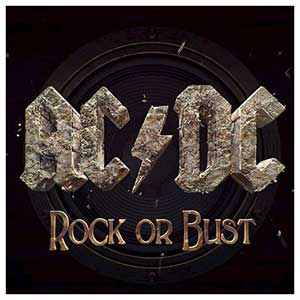
Nothing can last forever. For a while in 2014, it looked as though AC/DC’s time might be up. Malcolm Young, who founded the band with brother and fellow guitarist Angus in 1973, was diagnosed with dementia and had retired from the band. It seemed unthinkable but, holed up with producer Brendan O’Brien in a Vancouver studio, and with Young’s nephew Stevie Young filling in on rhythm, carry on they did.
And how. Rock Or Bust, the product of AC/DC’s own uncertain times, is a towering retort to any notion that they might be finished. As the name suggests, it’s an album that places its faith at the feet of rock‘n’roll, both as a restorative force and also as a vaccine against all ills. Nowhere is this more explicitly stated than on the title track, which heaves along on the kind of monolithic riff Angus Young patented sometime around the Stone Age. Phil Rudd’s drums crash, Cliff Williams’ bass throbs and Johnson squeals out a defiant, ends-of-the-earth manifesto: ‘In rock’n’roll we trust/It’s rock or bust.’ Quite.
Lean – at around 35 minutes it even outdoes 1983’s Flick Of The Switch in the brevity stakes – it is also mean: the absolute essence of AC/DC, decanted with an energy and power that never lets up. Got Some Rock & Roll Thunder is huge, swept up by a mighty Angus solo and a classic rhythmic chop from Stevie. Baptism By Fire continues the elemental theme, propelled by a roaring lick and that most under-appreciated facet of Angus’s playing: his sensitivity. Hard Times chugs forth on a funky riff that, perversely or not, brings to mind Ian Dury’s Sex & Drugs & Rock And Roll.
And if Johnson’s belligerent voice is the star of Emission Control, the song is essentially driven by Young’s astonishing ability to navigate his way around a blues scale. It could easily be Black Sabbath in their evil prime.
Sure, half the songs are about shagging or wanting to shag at a stage where they should be writing about bad backs and pension plans, but this is AC/DC, lest we forget. And if they’ve taught us anything, it’s that the beating heart of great rock‘n’roll is forever locked in a state of adolescence.
Live at River Plate (2012)
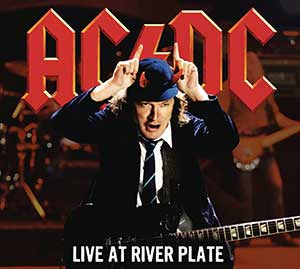
AC/DC’s first live album in 20 years would be a very big deal, were it not for one simple fact: the DVD version, which was released the year before in 2011, was so much better.
On DVD, Live At River Plate is sensational. Filmed at a football stadium in the Argentinian capital of Buenos Aires during the Black Ice tour, it captures a brilliant performance from the band and the heated atmosphere generated by an ecstatic South American crowd. The moment when singer Brian Johnson first looks out at the mass of fans – his fists raised and face lit up in amazement – is priceless.
By comparison, this plain old CD version comes off second best. But it’s still a great live album, with an electrifying ambience and a setlist that’s perfectly judged: four tracks from Black Ice, a cult classic in Dog Eat Dog, and an unbeatable home run of You Shook Me All Night Long, T.N.T., Whole Lotta Rosie, Let There Be Rock, Highway To Hell and For Those About To Rock (We Salute You).
It was proof, if it were needed, that AC/DC were still the best rock’n’roll band in the world.
Live (1992)
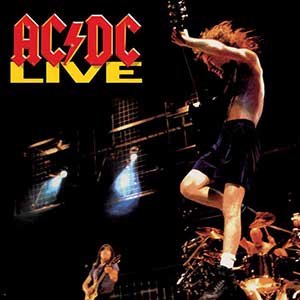
AC/DC’s second live album was recorded over several dates on 1991’s The Razor’s Edge Tour and features tracks cut in Glasgow, Moscow, Donington, Birmingham and Edmonton. If you considered it as a follow up to If You Want Blood, the setlist works as a celebration of the Brian Johnson years: the likes of Heatseeker, Money Talks, Thunderstruck and, of course, tracks from Back In Black, nestle against half a dozen Bon-era tracks – and don’t suffer by the comparison. At all.
Live is a triumphant refutation to anyone who still claims ‘DC died with Bon. Jonno is in fine voice and good humour throughout, and the live setting gives Angus space to stretch out a bit. Released as a single and double disc collector’s edition, it’s worth getting the latter, mostly because you get to hear the band’s epic 14 minute, solo-laced, take on Jailbreak, but also just because – duh – more AC/DC is obviously better than less.
The Razors Edge (1990)
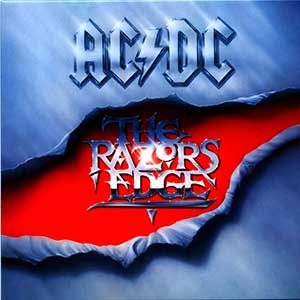
Producer Bruce Fairbairn, the man who had revitalised Aerosmith’s career three years before with Permanent Vacation, took Angus Young to one side: “I want you to sound like AC/DC when you were 17,” he said. Nowhere was that trademark sound captured better than on The Razors Edge’s opener, Thunderstruck. Introduced by an electrifying Angus Young riff, comprised of hammer-on and pull-off fingering on an open B string, the track builds dynamically using terrace chants and new drummer Chris Slade’s brutal but simplistic poundings to emerge as a state-of-the-art stadium leveller.
This simple premise was hammered home by Fire Your Guns and Moneytalks, the former built around a biting blues riff and classic single-entendre sex talk, the latter positioning Johnson as a sleazy Wall Street lothario (‘Hey little girl, you want it all/The furs, the diamonds, the painting on the wall’) – instantly addictive, it remains AC/DC’s highest-charting US single. The ominous-sounding title track, meanwhile, was that rarest of AC/DC songs, a rumination on global politics.
Not everything on The Razors Edge was so striking. Mistress For Christmas, inspired by Donald Trump, then making tabloid headlines for an extra-marital liaison with US actress Marla Maples, might be the single worst song the band have ever recorded, while you’d be hard pressed to find a single AC/DC devotee who could sing you the chorus of Goodbye & Good Riddance To Bad Luck or the frantically funky Rock Your Heart Out.
But, kicking off a decade that would see words such as ‘grunge’, ‘nu metal’ and ‘pop-punk’ enter the rock lexicon, The Razors Edge stands as AC/DC reclaiming their title of the world’s greatest hard rock band in the post-Appetite For Destruction landscape, with a hard-hitting, back-to-basics album.
Power Up (2020)
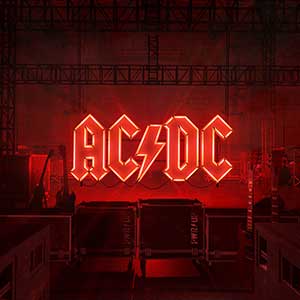
Well, they did it. The strut of Shot In The Dark, with those gang vocals that are so much a part of the ’DC style. The cascading melodic malevolence of Through The Mists Of Time and Witch’s Spell. And while Demon Fire has a humorously priapic wink, No Man’s Land flashes dirty rhythms and a cutthroat mean streak. All dozen tracks are winners.
Every song is credited as having been co-written by Malcolm Young, because many of the riffs date back to sessions for 2008’s Black Ice album when he was still on board, but these are far from recycled rejects. In fact they’re inspirational.
If you want signposts from past AC/DC albums, then think Flick Of The Switch and For Those About To Rock. In other words, Power Up basks in the glory of the early Johnson era. And that, most certainly, will do.
The studio team of producer Brendan O’Brien and engineer Mike Fraser, who worked on both Black Ice and 2014’s Rock Or Bust, do an admirable, unfussy job capturing the band’s iconic sound. It’s alive and bursting, concussive yet clean. Should this prove to be AC/DC’s farewell album (and who knows?), they will have gone out at the top of their game.
For Those About To Rock (1981)
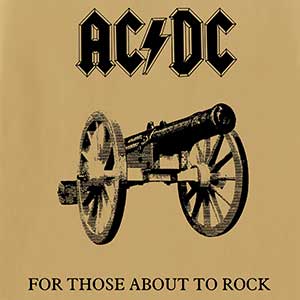
Their first US No.1, these days a lot of negativity surrounds For Those About To Rock. There was at the time of making it too. Sure, Back In Black had brought them back from the brink, but the band were tiring of manager Peter Mensch – and fired him that summer – and bored of producer Mutt Lange’s perfectionism, as they hung around the studio waiting for Lange to put the finishing touches on take after take. (It was his last album with the band.)
Malcolm said: “By the time we’d completed the album, I don’t think anyone, neither the band nor the producer, could tell whether it sounded right or wrong. Everyone was fed up with the whole album.”
Listening back now, it’s not difficult to see why. Tracks like the pedestrian first single Let’s Get It Up, or the self-consciously scary Evil Walks, lacked the energy and wit of old. Double entendres had become single; riffs that had once been recycled were in danger of sounding tired and thin. The only song that truly reached the same heights as the best songs on Lange’s two previous AC/DC albums is the titanic title track. Named after a Roman gladiator’s motto, its gargantuan riff, heroic chorus and explosive climax made it the band’s biggest and loudest anthem.
30 years after its release, For Those About To Rock had sold four million copies in the US – roughly 18 million less than Back In Black and, astonishingly, two million less even than Dirty Deeds.
Dirty Deeds Done Dirt Cheap (1976)
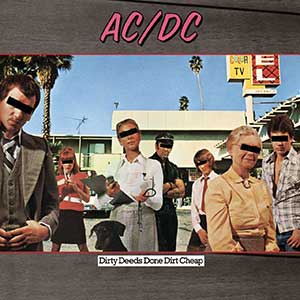
After delivering their second album for Atlantic Records, the band had a nasty surprise. Dirty Deeds Done Dirt Cheap – as its title clearly implied – was so rough-and-ready, so unpalatable to mainstream tastes, that the label refused to release it in the US (it came out there only after the band hit big in the 80s).
Atlantic had a point. It was never going to be a hit. But its menacing title track has endured as a live staple. And amid the lewd and crude stuff – the smutty Big Balls, the blistering Rocker, with Bon Scott self-mythologising as a ‘right-out-of-controller’ – there is a glimpse of the man behind the myth in the sorrowful Ride On.
Classic Rock’s Geoff Barton, in fact, once claimed that “Dirty Deeds is a tremendous record, arguably Scott’s best with AC/DC." That claim hinges on a song that’s atypical for the band: Ride On, the best bluesy ballad you’re ever likely to hear. Normal AC/DC service is resumed with the rip-snorting title track and the mischievous Problem Child. But following Scott’s death in February 1980, the desolate, searching spirit embodied by Ride On took on new meaning and significance. And that’s why Dirty Deeds will always be about that particular song.”
If You Want Blood (1978)
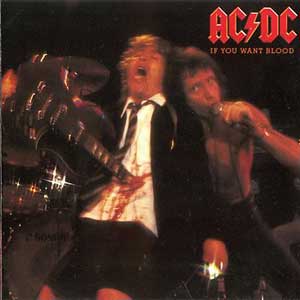
The title of this live album spoke volumes. So did the cover: Angus impaled on his own guitar, Bon Scott beside him, eyes glazed. It was symbolic of a band that gave everything they had on stage. If You Want Blood was recorded on 1978’s Powerage tour, much of the final cut coming from a gig in Glasgow, the Young brothers’ birthplace. “That,” said Angus, “was the magic show.”
Released on Friday 13th, If You Want Blood would include all the obvious crowd-pleasers like The Jack (its strictly live, ‘dirty’ lyrics included on record for the first time); Whole Lotta Rosie (with a new crowd chant of “Angus! Angus!” over the juddering intro recorded for the first time, thereby embedding it forever into the consciousness of all future generations of AC/DC concert-goers); and lengthy, barnstorming encores of Let There Be Rock (distinguished by the very real roar of approval from the Glasgow crowd at seeing the band return to the stage wearing Scotland football shirts); and Rocker, cleverly edited down from its usual 12-minutes-plus to a more radio-accommodating three minutes dead.
The result was one of the great live albums, rivalling Thin Lizzy’s Live And Dangerous and Motorhead’s No Sleep ’Til Hammersmith. If You Want Blood finally opened the doors of the UK Top 20 for AC/DC, eventually climbing as high as No.13.
- Top 10 Best Bon Scott AC/DC songs
- The 10 Best AC/DC Videos
- The Story Behind The Album: AC/DC's Back In Black
Let There Be Rock (1977)
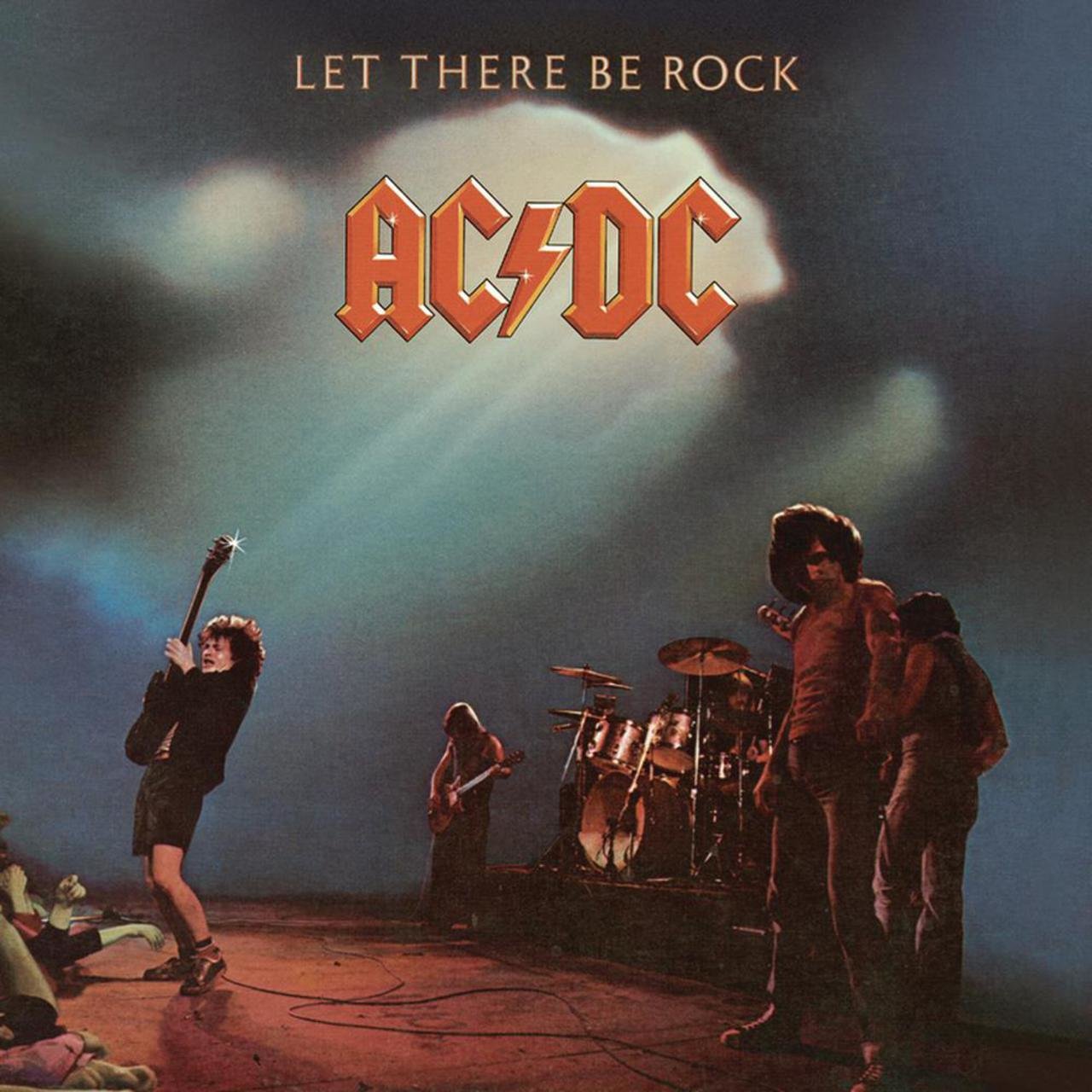
Malcolm Young once said of his band’s music: “It’s just loud rock‘n’roll – wham, bam, thank you mam!” No AC/DC album embodies that spirit better than Let There Be Rock. Released in ’77, when punk rock was at its height, the album had a raw edge, a manic intensity and a streetwise attitude that appealed to punks and headbangers alike.
If the three albums that came before it – High Voltage, T.N.T. and Dirty Deeds Done Dirt Cheap – had an increasingly high quotient of brilliance, Let There Be Rock was the one where AC/DC truly found their place in the scheme of things, not least on the title track, a heartfelt ode to original, no-shit rock’n’roll as evinced by the fastest, most irresistibly hair-shaking piece of high-octane noise ever committed to what was still then just poor, weak vinyl. Elsewhere, Hell Ain’t A Bad Place To Be stood as AC/DC’s own Brown Sugar.
“If you’re a purist and like the guitars being completely in tune and things being completely studio-sterile, that song’s gonna kill you,” bassist Mark Evans says of the latter, “because the guitars are whomping all over the place out of tune. But it’s just got that nasty, gritty feel about it that says AC/DC.”
Indeed the whole album sounds like it’s on the verge of spilling over into total feedback. It was recorded live in one room. Mistakes were tolerated if the vibe was strong enough, the energy audibly crackling over the speakers on tracks like Overdose or Bad Boy Boogie.
Recorded mostly live-in-the-studio (Hell Ain’t A Bad Place To Be is completely out of tune), it included two tracks that would become rock classics: Whole Lotta Rosie, Bon’s tribute to a 19-stone groupie, and the frenetic and profane title track. The title song became the one AC/DC would end their set with for years to come while Whole Lotta Rosie would be guaranteed to get the crowds moving. To paraphrase Bon’s fond and funny lyrics, it ain’t no fairy story but they give it all they’ve got. It’s a nineteen stone beauty.
High Voltage (1976)
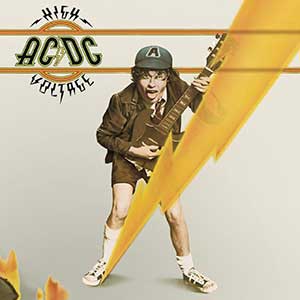
The album that introduced AC/DC to the world beyond Australia was not met with universal acclaim. Rolling Stone described High Voltage as an “all-time low” for rock music.
The album was comprised of the best tracks from the band’s first two Australia releases from 1975: the original High Voltage, and T.N.T.. Two of those songs have remained in AC/DC’s live set ever since: T.N.T. itself, with its wonderfully yobbish sensibility, and the dirty blues The Jack. And in Rock ‘N’ Roll Singer and It’s A Long Way To The Top (If You Wanna Rock ‘N’ Roll) – Bon’s tales of dreams and heartbreak – there is a hunger in his voice that burns.
The production, by Harry Vanda and George Young, is crisp and simplistic, in its way every bit as good as Robert John ‘Mutt’ Lange’s more sophisticated knob-twiddlings on later AC/DC diamonds such as Highway To Hell and Back In Black. And you gotta admire the audacity of including bagpipes on opening track It’s A Long Way To The Top, AC/DC’s Scottish heritage not being widely appreciated at this early point in their career. An international debut to savour.
Highway To Hell (1979)
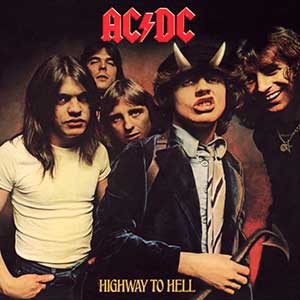
Highway To Hell was the band’s big breakthrough, their first million-seller. And, sadly, the last record that Bon Scott ever made.
Highway To Hell was a triumph rescued from the jaws of disaster, an album with so much commercial expectation riding upon it that Atlantic Records originally attempted to bully the band into covering The Spencer Davis Group’s 1966 hit Gimme Some Lovin’ in a desperate bid for chart action.
Mindful that the pressure was on, Malcolm Young (and the group’s new hot-shot manager Peter Mensch) fired original producer Eddie Kramer, hired in Robert ‘Mutt’ Lange, and forced his band to knuckle down for three month’s solid graft in the studio. The result was the most polished, professional and powerful album of the quintet’s career… and subsequently their first million-selling disc in America.
Mutt Lange’s genius was to translate all the blood, sweat and tears squeezed out of his charges in London’s Roundhouse Studio into an album that sounds effortless, care-free and spontaneous. AC/DC never lacked balls, energy or thuggish aggression, but on Highway To Hell their swinging punches were delivered with precision and poise, impacting with heart-stopping force. The devil, as ever with Lange, is in the details here. The lairy gang vocals on the chorus of Walk All Over You (close your eyes and tell me you can’t instantly see Malcolm Young shuffling forward towards his mic stand as you read those words). Those economical, brutally effective guitar stabs on the verses of Touch Too Much. The breath-robbing full-tilt climax of If You Want Blood. The unstoppable, rolling momentum of Girls Got Rhythm.
Bon, throughout, is at his most commanding, compelling and irresistible, cock o’ the walk in a rough ‘n’ tumble, spit ‘n’ sawdust world where “nobody’s playing Manilow”, rolling with the punches (both Beating Around The Bush and Shot Down In Flames lay out scenarios in which the horn-dog singer’s ego takes a bruising) and always on the sniff for the next adventure, as detailed so memorably on the album’s title track.
Classic Rock once described Highway To Hell as “not just AC/DC’s greatest song, but the ultimate rock anthem, period” and the song is Bon as he’ll always be remembered – cocksure, rumbustious and ready to take on the world with a gap-toothed grin, come whatever may. It’s the sound of freedom, the sound of the world’s greatest rock ‘n’ roll band at their most feral and fearless. Highway To Hell is Bon Scott and his band at their most gloriously, thrillingly alive.
Powerage (1978)
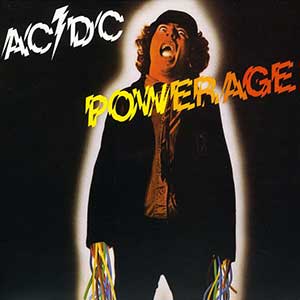
"Powerage couldn’t be better,” says Blackberry Smoke's Charlie Starr. "The lyrics are genius, the riffs are as good as anything before or after, and it features some fantastic guitar work from Angus and Malcolm. As great as Highway to Hell would be next, Powerage was the last time that they were raw and under-produced and in their element. It’s just so gritty and real, warts and all."
Conceived as a showcase that would place AC/DC right up there with the American superstars they were now sharing stages with, Powerage was split down the middle between yet more ton-up AC/DC classics such as Down Payment Blues, and more elliptical tracks such as What’s Next To The Moon.
In the former, the difference in mood is pinpointed by the change in perspective of Bon’s lyrics. He was still writing about the long way to the top, but no longer self-mythologising, talking instead of ‘Feeling like a paper cup/Floating down a storm drain’. The latter, with its circular guitar figure replacing the juddering block chords of yore, was the most transcendent moment on any AC/DC album yet, the lyrics staring past love and pain, focusing instead on that thing just out of reach.
It had the same yo-yoing dynamic throughout its nine tracks: one moment a perfect-10 rock monster like Riff Raff, its crazed, spiralling riff belying its solitary verse about being ‘Down in Mexico’, the next moment another seductively mid-paced stroller built around a tight, almost pop guitar figure: Gone Shootin. This time, though, the subject matter is truly murky: a song about a girl who ‘sure is loaded’ and ‘never says bye bye’, it’s a direct reference to Bon’s on-off relationship with his girlfriend Silver.
Sin City begins like classic AC/DC – towering intro, all-guns-blazing riff – but again the story is much deeper. On the surface, about a gambler going ‘in to win’ in Las Vegas, it’s also a metaphor for the assault AC/DC were now intent on making on the US charts. With its low-slung guitars and chugging drums, Gimme A Bullet sounds more like the Lynyrd Skynyrd number it almost steals its title from than anything AC/DC had put down on vinyl before.
The final two tracks, Up To My Neck In You and Kicked In The Teeth, also exemplify this new dynamic. Although both date back to the earlier Powerage sessions of six months before, only the latter sounds like it comes from an earlier era, Bon literally screaming over the intro about a ‘two-faced woman’ telling ‘two-faced lies’.
Keith Richards knows a thing or two about rock’n’roll. So does Joe Perry. And both have cited Powerage as their favourite AC/DC album. It is, simply, AC/DC’s purest rock’n’roll record. “The whole band means it, and you can hear it,” Richards said.
(Footnote: We reviewed it in our Facebook Group, the Album of The Week Club and it got the third highest score out of all albums reviewed.)
Back In Black (1980)
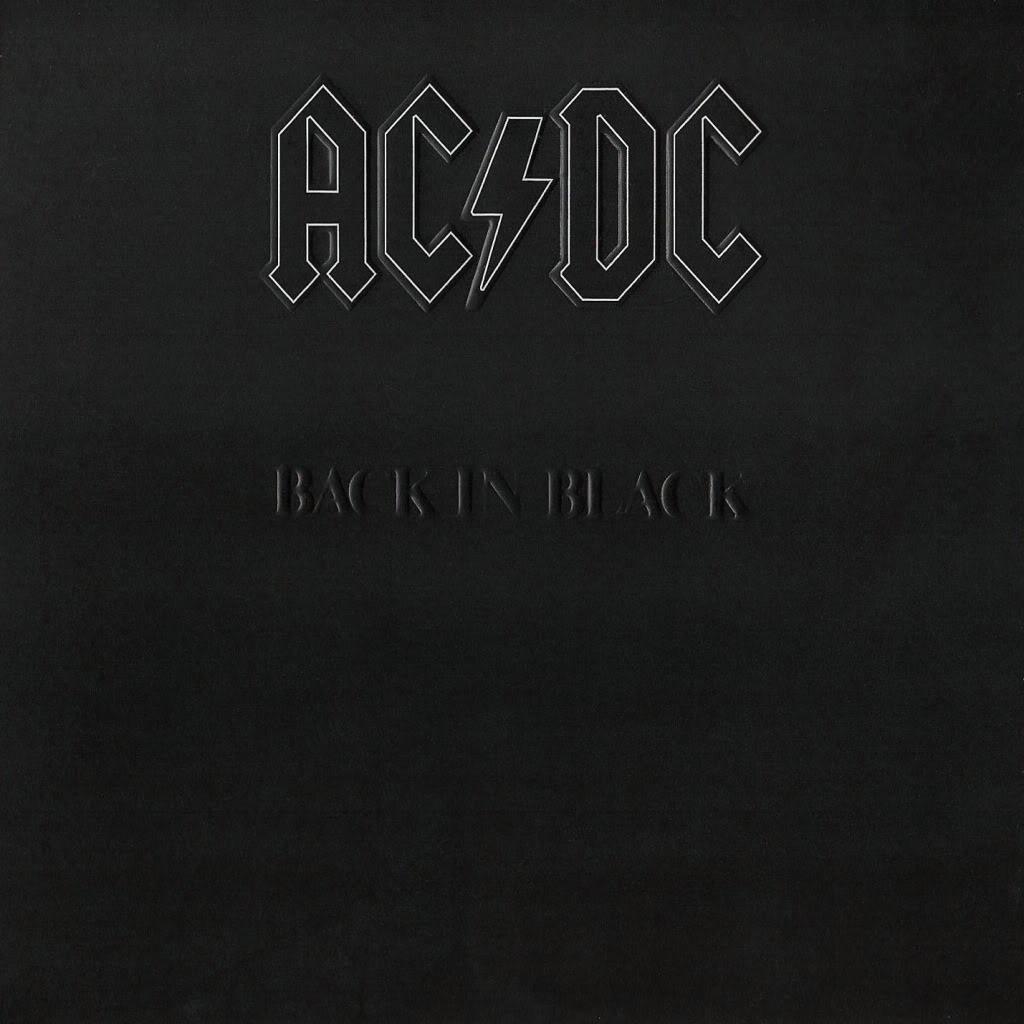
There was a powerful significance in that title, and that none-more-black cover. Angus described Back In Black as “our tribute to Bon”, but it became so much more than that. The biggest-selling album of AC/DC’s career, and the second-biggest-selling ever (after Michael Jackson’s Thriller) Back In Black is the mother of all comeback records and arguably the greatest hard rock album of all time.
The way the band tell it, it was the worst of times and it was the best of times. Bon’s death had shaken them, but this new singer gelled instantly and the ideas came thick and fast. Recording in the Bahamas, and three songs into the recording, newbie Brian Johnson worried that he was going to run out of lyrics. Looking for inspiration for Hells Bells, a tropical thunderstorm raged outside. “I said: ‘That’s rolling thunder, that’s what they call it in England’,” remembered Brian. Mutt Lange told him: “Rolling thunder? Write that down.” The rain fell. Brian noted, ‘Pourin’ rain!’ “And the wind whipped up – ‘I’m comin’ on like a hurricane!’ I was gone. The song was ready that night. I hadn’t even heard the track…” Similarly, his “southern preacher” spoken word intro to Rock And Roll Ain’t Noise Pollution was done off the cuff in one take: “I never ever thought that it was gonna be on the record,” said Brian.
Back In Black, Malcolm said later, was AC/DC remembering “the good times” they’d had with Bon. Have A Drink On Me had been recorded as a demo with Bon on drums. The lyrics (‘Whisky, gin and brandy/With a glass I’m pretty handy’) were a drunken toast from Brian to his predecessor. With You Shook Me All Night Long Brian proved he had as much of a way with a double-entendre as his predecessor: ‘She told me to come but I was already there.’
On previous album Highway To Hell, Mutt Lange had polished up the band’s sound and made them more commercial without losing their core identity. You Shook Me All Night Long perfectly illustrates Lange’s ability to bring an entirely acceptable pop sensibility to a hard rock band as he helps the band deliver a singalong, ‘arms around your best mate’s shoulder’ winner of a tune.
It has so many classic songs: Shoot To Thrill, What Do You Do For Money Honey (a song that dates from the Powerage sessions), and of course that genius title track, built on a juddering riff that sounds like the blues if it was deconstructed by Satan and then rebuilt by Tony Stark. Out of tragedy came AC/DC’s greatest triumph.
“Back In Black is not just the best album AC/DC have ever made,” Classic Rock’s Paul Elliott once wrote. “It’s the best album anybody has ever made.”
Words: Paul Elliott, Rob Hughes, Mick Wall, Geoff Barton, Ken McIntyre, Paul Brannigan, Scott Rowley, Philip Wilding, Malcolm Dome, Ben Mitchell, Fraser Lewry

What is the order of the AC/DC albums?
If you want a list of AC/DC studio albums, you got it.
High Voltage (1975)
T.N.T. (1976)
Dirty Deeds Done Dirt Cheap (1976)
Let There Be Rock (1977)
Powerage (1978)
Highway to Hell (1979)
Back in Black (1980)
For Those About to Rock We Salute You (1981)
Flick of the Switch (1983)
Fly on the Wall (1985)
Blow Up Your Video (1988)
The Razors Edge (1990)
Ballbreaker (1995)
Stiff Upper Lip (2000)
Black Ice (2008)
Rock or Bust (2014)
Power Up (2020)
What is AC/DC's biggest selling album?
Back In Black has sold an estimated 50 million copies since its release in 1980, and is only second to Michael Jackson's Thriller as the biggest-selling album of all time.
What was AC/DC's biggest hit?
Their 1990 single Moneytalks was the band's biggest hit in America, and reached 23 in the Billboard Hot 100. It also earned the band a Top 40 single in the UK. In Australia, the band have earned many Top 10 singles, including High Voltage, It's a Long Way to the Top (If You Wanna Rock 'n' Roll), Jailbreak, You Shook Me All Night Long, Thunderstruck and Heatseeker. In terms of legacy, though, it's hard to look past Back In Black and Highway To Hell, which currently both have over a billion streams on Spotify each.
What does AC/DC stand for?
The band's name stands for 'alternating current/direct current', which refers to the flow of electricity in a circuit. Angus and Malcolm Young's sister Margaret had a sewing machine and the acronym was spotted on its adaptor. They could have easily called themselves Sewing Machine, if you think about it.
Classic Rock is the online home of the world's best rock'n'roll magazine. We bring you breaking news, exclusive interviews and behind-the-scenes features, as well as unrivalled access to the biggest names in rock music; from Led Zeppelin to Deep Purple, Guns N’ Roses to the Rolling Stones, AC/DC to the Sex Pistols, and everything in between. Our expert writers bring you the very best on established and emerging bands plus everything you need to know about the mightiest new music releases.

